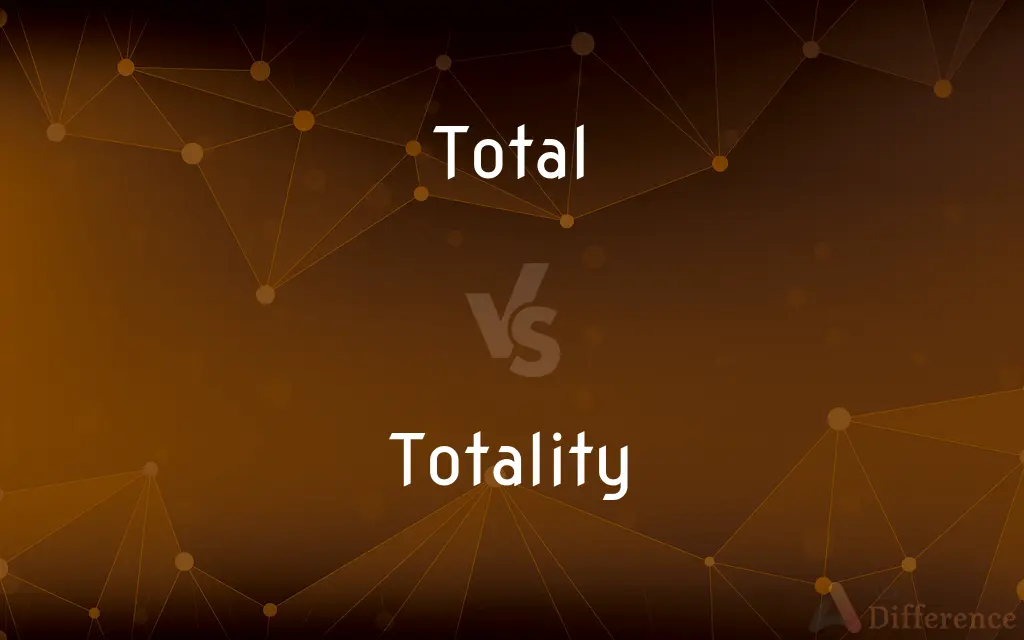Total vs. Totality — What's the Difference?
By Tayyaba Rehman & Maham Liaqat — Updated on April 5, 2024
Total refers to the sum or whole amount, focusing on numerical aggregation, while totality encompasses completeness or entirety, often beyond mere numbers.

Difference Between Total and Totality
Table of Contents
ADVERTISEMENT
Key Differences
Total represents the sum of parts or quantities, implying a process of addition to reach a final amount. It is primarily used in quantitative contexts, such as calculating expenses. On the other hand, totality suggests a state of being complete or whole, extending beyond the numerical to include qualitative aspects. It embodies the entire scope or extent of something, emphasizing fullness and completeness.
Total is often used in contexts requiring precise measurement and quantification, like accounting or statistics, where the focus is on arriving at a specific sum. Totality, whereas, is invoked in discussions about the overall essence or nature of an entity, suggesting a comprehensive understanding or experience that includes all components and nuances.
In mathematics, total refers to the result of adding numbers or quantities together, a straightforward numerical concept. Totality, on the other hand, can be philosophical, referring to the complete nature or essence of a subject, not limited by numerical value but by the fullness of its characteristics.
When considering user feedback on a product, total might refer to the aggregate score or number of responses. Totality, whereas, would consider the complete range of feedback, including qualitative reviews and the spectrum of user experiences, offering a more holistic view.
In legal documents or technical specifications, total indicates a specific, quantifiable amount, such as total cost or total pages. Totality, on the other hand, might be used to refer to the full implications or scope of a contract, encompassing all its terms, conditions, and potential impacts, beyond just the numerical aspects.
ADVERTISEMENT
Comparison Chart
Definition
The sum or aggregate amount.
The state of being complete or whole.
Usage Context
Quantitative analysis, financial calculations.
Qualitative assessments, philosophical discussions.
Focus
Numerical aggregation.
Completeness, encompassing all aspects.
Examples
Total income, total distance.
Totality of evidence, totality of circumstances.
Nature
Precise, measurable.
Abstract, comprehensive.
Compare with Definitions
Total
Total refers to the final sum of numbers or quantities.
The total of 5 and 3 is 8.
Totality
Totality represents the whole extent or fullness of a situation.
The totality of the circumstances influenced the decision.
Total
In finance, total signifies the overall sum of transactions.
The total expenses exceeded the budget.
Totality
Totality can signify the entirety of existence or the universe.
Philosophers often debate the totality of human experience.
Total
Total implies the aggregate of components in a set.
The total weight of the luggage must not exceed the limit.
Totality
Totality refers to the comprehensive amount of information or data.
The researcher analyzed the totality of the evidence.
Total
Total can denote the entire amount of something available.
The total number of attendees was 50.
Totality
In astronomy, totality is the period during an eclipse when the light is completely blocked.
During the eclipse, we observed the totality for two minutes.
Total
Total also describes complete destruction or ruin.
The car was a total loss after the accident.
Totality
It can denote completeness in terms of qualities or conditions.
The totality of the artwork’s beauty is overwhelming.
Total
Complete in extent or degree and in every particular;
A full game
A total eclipse
A total disaster
Totality
The quality or state of being total
Appalled by the totality of the destruction.
Total
Comprising the whole number or amount
A total cost of £4,000
Totality
An aggregate amount; a sum.
Total
Complete; absolute
A total stranger
It is a matter of total indifference to me
Totality
The phase of an eclipse when it is total.
Total
The whole number or amount of something
In total, 200 people were interviewed
He scored a total of thirty-three points
Totality
The state of being total.
Total
Amount in number to
They were left with debts totalling £6,260
Totality
An aggregate quantity obtained by addition.
Total
Damage (something, typically a vehicle) beyond repair; wreck
He almost totalled the car
Totality
(astronomy) The phase of an eclipse when it is total.
Total
An amount obtained by addition; a sum.
Totality
The quality or state of being total; as, the totality of an eclipse.
Total
The whole amount of something; the entirety
The storm damaged the total of the housing units.
Totality
The whole sum; the whole quantity or amount; the entirety; as, the totality of human knowledge.
The totality of a sentence or passage.
Total
Of, relating to, or constituting the whole amount; entire
The total population of the city.
Totality
The state of being total;
Appalled by the totality of the destruction
Total
Complete; utter; absolute
Total concentration.
A total effort.
A total fool.
Totality
The quality of being complete and indiscriminate;
The totality of war and its consequences
The all-embracing totality of the state
Total
To determine the total of; add up
They totaled the applications at 600.
Totality
The whole amount
Total
To equal a total of; amount to
The week's receipts totaled more than $90,000.
Total
To wreck completely; demolish
The driver survived the crash but totaled the car.
Total
To add up; amount
It totals to $25.
Total
An amount obtained by the addition of smaller amounts.
A total of £145 was raised by the bring-and-buy stall.
Total
Sum.
The total of 4, 5 and 6 is 15.
Total
Entire; relating to the whole of something.
The total book is rubbish from start to finish.
The total number of votes cast is 3,270.
Total
(used as an intensifier) Complete; absolute.
He is a total failure.
Total
(mathematics) (of a function) Defined on all possible inputs.
The Ackermann function is one of the simplest and earliest examples of a total computable function that is not primitive recursive.
Total
(transitive) To add up; to calculate the sum of.
When we totalled the takings, we always got a different figure.
Total
To equal a total of; to amount to.
That totals seven times so far.
Total
To demolish; to wreck completely. (from total loss)
Honey, I’m OK, but I’ve totaled the car.
Total
(intransitive) To amount to; to add up to.
It totals nearly a pound.
Total
Whole; not divided; entire; full; complete; absolute; as, a total departure from the evidence; a total loss.
Total
The whole; the whole sum or amount; as, these sums added make the grand total of five millions.
Total
To bring to a total; also, to reach as a total; to amount to.
Total
To determine the total of (a set of numbers); to add; - often used with up; as, to total up the bill.
Total
To damage beyond repair; - used especially of vehicles damaged in an accident; as, he skid on an ice patch and totaled his Mercedes against a tree. From total loss.
Total
The whole amount
Total
A quantity obtained by addition
Total
Add up in number or quantity;
The bills amounted to $2,000
The bill came to $2,000
Total
Determine the sum of;
Add all the people in this town to those of the neighboring town
Total
Constituting the full quantity or extent; complete;
An entire town devastated by an earthquake
Gave full attention
A total failure
Total
Including everything;
The overall cost
The total amount owed
Total
Without conditions or limitations;
A total ban
Common Curiosities
How does totality differ from total in qualitative research?
In qualitative research, totality refers to the complete understanding of a phenomenon, considering all aspects and nuances, unlike total, which quantifies elements.
Can total and totality be used interchangeably?
While they share thematic similarities, their usage is context-dependent; total is quantitative, and totality is qualitative or comprehensive.
What does total loss mean?
Total loss refers to a situation where an item is so damaged that repairing it is either impossible or not economical.
What is total in mathematics?
Total in mathematics refers to the sum obtained by adding numbers together.
How is totality used in legal contexts?
In legal contexts, totality refers to considering all circumstances and evidence comprehensively to ensure fair judgment.
Is totality important in philosophical discussions?
Yes, totality is crucial in philosophical discussions for exploring the complete essence or nature of concepts and existence.
What does totality of evidence mean?
Totality of evidence refers to considering all available evidence in its entirety to make a comprehensive assessment.
How is total calculated in statistics?
In statistics, total is calculated by summing numerical data to provide aggregate values for analysis.
What role does total play in financial statements?
Total sums up specific financial elements, like expenses or revenues, providing a quantifiable measure of financial performance.
Why is totality important in holistic approaches?
Totality is important in holistic approaches for ensuring all aspects of a situation or condition are considered for a comprehensive understanding or solution.
Does total refer only to positive numbers?
No, total can include the sum of both positive and negative numbers, depending on the context.
How does the concept of totality relate to the universe?
The concept of totality relates to the universe by considering it as a whole, including all matter, energy, and the laws governing them.
Can the concept of totality apply to personal experiences?
Yes, totality can apply to personal experiences by encompassing the full range and depth of those experiences.
How does total impact budget planning?
Total impacts budget planning by providing a numerical benchmark for financial resources, expenses, and allocations.
Can total be used to describe the extent of damage?
Yes, total can describe the extent of damage, especially when it implies complete destruction or the need for replacement.
Share Your Discovery

Previous Comparison
Mingle vs. Single
Next Comparison
Love vs. SmittenAuthor Spotlight
Written by
Tayyaba RehmanTayyaba Rehman is a distinguished writer, currently serving as a primary contributor to askdifference.com. As a researcher in semantics and etymology, Tayyaba's passion for the complexity of languages and their distinctions has found a perfect home on the platform. Tayyaba delves into the intricacies of language, distinguishing between commonly confused words and phrases, thereby providing clarity for readers worldwide.
Co-written by
Maham Liaqat














































